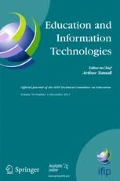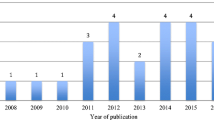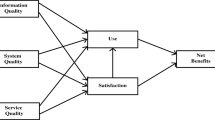Abstract
The widespread adoption of social networking sites among college students has motivated an increasing number of researchers to discern the relationship between social networking site use and academic performance. However, these studies mainly address the direct effect of social networking site use on academic performance, thus failing to identify and incorporate relevant explanatory mechanisms. The present study addresses this gap by examining the mediating role of student engagement in the relationship between social networking site use and academic performance. The study gathered pertinent data from a sample of college students (N = 180) by using a questionnaire, which measured social networking site use based on the number of hours students spent daily on six popular social networking sites, student engagement using a ten-item scale adapted from the literature, and academic performance using semester grade-point average. An empirical test of the mediation model using the PROCESS macro demonstrates that student engagement mediates the negative association between social networking site use and college students’ academic performance. This study contributes to the literature by documenting pioneering evidence of the mediating role of student engagement.

Similar content being viewed by others
References
Alhabash, S., & Ma, M. (2017). A tale of four platforms: Motivations and uses of Facebook, twitter, Instagram, and Snapchat among college students? Social media + society, 3(1), January–March, 1–13.
Alt, D. (2015). College students’ academic motivation, media engagement and fear of missing out. Computers in Human Behavior, 49, 111–119.
Cao, X., Masood, A., Luqman, A., & Ali, A. (2018). Excessive use of mobile social networking sites and poor academic performance: Antecedents and consequences from stressor-strain outcome perspective. Computers in Human Behavior, 85, 163–174.
Carini, R. M., Kuh, G. D., & Klein, S. P. (2006). Student engagement and student learning: Testing the linkages. Research in Higher Education, 47(1), 1–32.
Doleck, T., Bazelais, P., & Lemay, D. J. (2018). Social networking sites and academic performance: A generalized structured component approach. Journal of Educational Computing Research, 56(7), 1129–1148.
Eid, M. I. M., & Al-Jabri, I. M. (2016). Social networking, knowledge sharing, and student learning: The case of university students. Computers and Education, 99, 14–27.
Ellison, N., & Boyd, D. (2013). Sociality through social network sites. In W. Dutton (Ed.), The Oxford handbook of internet studies (pp. 151–172). Oxford: Oxford University Press.
Facebook. (2019). Facebook reports fourth quarter and full year 2018 results. Retrieved from https://investor.fb.com/investor-news/press-release-details/2019/Facebook-Reports- Fourth-Quarter-and-Full-Year-2018-Results/default.aspx.
Felisoni, D. D., & Godoi, A. S. (2018). Cell phone usage and academic performance: An experiment. Computers and Education, 117, 175–187.
Fredricks, J. A., Blumenfeld, P. C., & Paris, A. H. (2004). School engagement: Potential of the concept, state of the evidence. Review of Educational Research, 74(1), 59–109.
Fredricks, J. A., & McColskey, W. (2012). The measurement of student engagement: A comparative analysis of various methods and student self-report instruments. In S. Christenson, A. L. Reschy, & C. Wylie (Eds.), Handbook of research on student engagement (pp. 319–339). New York: Springer.
Fredricks, J. A., Wang, M., Schall Linn, J. S., Hofkens, T. L., Sung, H., Parr, A., & Allerton, J. (2016). Using qualitative methods to develop a survey measure of math and science engagement. Learning and Instruction, 43, 5–15.
Furlong, M. J., & Christenson, S. L. (2008). Engaging students at school and with learning: A relevant construct for ALL students. Psychology in the Schools, 45(5), 365–368.
Giunchiglia, F., Zeni, M., Gobbi, E., Bignotti, E., & Bison, I. (2018). Mobile social media usage and academic performance. Computers in Human Behavior, 82, 177–185.
Hair, J. F., Hult, G. T. M., Ringle, C. M., & Sarstedt, M. (2017). A primer on partial least squares structural equation modeling (PLS-SEM). Thousands (2nd ed.). Oak: SAGE.
Hayes, A. F. (2013). Introduction to mediation, moderation, and conditional process analysis: A regression-based approach. New York: Guilford Press.
Ifinedo, P. (2016). Applying uses and gratifications theory and social influence processes to understand students’ pervasive adoption of social networking sites: Perspectives from the Americas. International Journal of Information Management, 36(2), 192–206.
Janosz, M. (2012). Commentary: Outcomes of engagement and engagement as an outcome: Some consensus, divergences and unanswered questions- part IV. In S. Christenson, A. L. Reschy, & C. Wylie (Eds.), Handbook of research on student engagement (pp. 403–420). New York: Springer.
Junco, R. (2012). The relationship between frequency of Facebook use, participation in Facebook activities, and student engagement. Computers and Education, 58(1), 162–171.
Junco, R. (2015). Student class standing, Facebook use, and academic performance. Journal of Applied Developmental Psychology, 36, 18–29.
Junco, R., & Cotten, S. R. (2012). No A 4 U: The relationship between multitasking and academic performance. Computers and Education, 59, 505–514.
Kane, G. C., Alavi, M., Labianca, G., & Borgatti, S. P. (2014). What’s different about social media networks? A framework and research agenda. MIS Quarterly, 38(1), 274–304.
Kaplan, A. M., & Haenlein, M. (2010). Users of the world, unite! The challenges and opportunities of social media. Business Horizons, 53(1), 59–68.
Karpinski, A. C., Kirschner, P. A., Ozer, I., Mellott, J. A., & Ochwo, P. (2013). An exploration of social networking site use, multitasking, and academic performance among United States and European university students. Computers in Human Behavior, 29(3), 1182–1192.
Krosnick, J. A., & Presser, S. (2010). Question and questionnaire design. In P. V. Marsden & D. W. James (Eds.), Handbook of survey research (2nd ed). Bingley, UK.
Kuh, G. D. (2009). What student affairs professionals need to know about student engagement. Journal of College Student Development, 50(6), 683–706.
Lam, S., Wong, B. P. H., Yang, H., & Liu, Y. (2012). Understanding student engagement with a contextual model. In S. Christenson, A. L. Reschy, & C. Wylie (Eds.), Handbook of research on student engagement (pp. 403–420). New York: Springer.
Lampe, C., Wohn, D. Y., Vitak, J., Ellison, N. B., & Wash, R. (2011). Student use of Facebook for organizing collaborative classroom activities. Computer Supported Collaborative Learning, 6, 329–347.
Lau, W. W. F. (2017). Effects of social media usage and social media multitasking on the academic performance of university students. Computers in Human Behavior, 68, 286–291.
Lemay, D. J., Bazelais, P., & Doleck, T. (2020). Patterns of social networking use and academic performance: Examining the link between quality and frequency of social networking use and academic performance among college-level students. Education and Information Technologies.
Lepp, A, Barkley, J. E, & Karpinski, A. C. (2015). The relationship between cell phone use and academic performance in a sample of US college students. Sage Open, 5.
MacKinnon, D. P., Fairchild, A. J., & Fritz, M. S. (2007). Mediation analysis. Annual Review of Psychology, 58, 593–614.
Macnamara, J., & Zerfass, A. (2012). Social media communication in organizations: The challenges of balancing openness, strategy and management. International Journal of Strategic Communication, 6(4), 287–308.
Marker, C., Gnambs, T., & Appel, M. (2018). Active on Facebook and failing at school? Meta-analytic findings on the relationship between online social networking activities and academic achievement. Educational Psychology Review, 30(3), 651–677.
Nie, N. H. (2001). Sociability, interpersonal relations, and the Internet: Reconciling conflicting findings. American Behavioral Scientist, 45, 420–435.
Ouirdi, M. E., El Ouirdi, A. E., Segers, J., & Henderickx, E. (2014). Social media conceptualization and taxonomy: A Lasswellian framework. Journal of Creative Communications, 9(2), 107–126.
Podsakoff, P. M., MacKenzie, S. B., & Podsakoff, N. P. (2012). Sources of method bias in social science research and recommendations on how to control it. Annual Review of Psychology, 63, 539–569.
Skinner, E. A., & Pitzer, J. R. (2012). Developmental dynamics of student engagement, coping, and everyday resilience. In S. Christenson, A. L. Reschy, & C. Wylie (Eds.), Handbook of research on student engagement (pp. 21–45). New York: Springer.
Tokunaga, R. S. (2016). An examination of functional difficulties from Internet use: Media habit and displacement theory explanations. Human Communication Research, 42, 339–370.
Wang, M., Fredricks, J. A., Ye, F., Hofkens, T. L., & Linn, J. S. (2016). The math and science engagement scales: Scale development, validation, and psychometric properties. Learning and Instruction, 43, 16–26.
Wang, Y., Niiya, M., Mark, G., Reich, S., & Warschauer, M. (2015). Coming of age (digitally): An ecological view of social media use among college students. CSCW’15, March 14–18, 2015, Vancouver, BC, Canada.
Zhang, Y., & Leung, L. (2015). A review of social networking service (SNS) research in communication journals from 2006 to 2011. New Media and Society, 17(7), 1007–1024.
Zhao, X., Lynch, J. G., & Chen, Q. (2010). Reconsidering baron and Kenny: Myths and truths about mediation analysis. Journal of Consumer Research, 37(2), 197–206.
Author information
Authors and Affiliations
Corresponding author
Additional information
Publisher’s note
Springer Nature remains neutral with regard to jurisdictional claims in published maps and institutional affiliations.
Rights and permissions
About this article
Cite this article
Tafesse, W. The effect of social networking site use on college students’ academic performance: the mediating role of student engagement. Educ Inf Technol 25, 4747–4763 (2020). https://doi.org/10.1007/s10639-020-10162-y
Received:
Accepted:
Published:
Issue Date:
DOI: https://doi.org/10.1007/s10639-020-10162-y




